Memorial Day
Stored in a cabinet drawer in the office of my parent’s home was a small wooden box. A tempting little thing kept safely out of reach from us children. The only explanation given was that it was dad’s and we were not to touch it. I did, however, catch a glimpse of it once—I have a vague memory of small curling pieces of thick paper, brown with age.
As a teenager, I once again stumbled on that wooden box. Unable to resist the temptation, I ‘accidentally’ bumped the lid. Inside was an old photograph of a rock and palm trees, next to it a small square of fabric. Before I could look any further, the sound of mom coming down the hall put a swift end to my sleuthing.
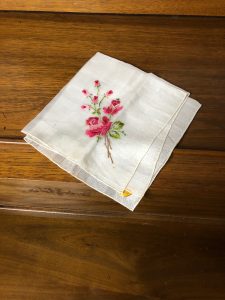
But those weren’t the only mementos in my family history. Hanging on the wall in my parent’s bedroom was a shadow box filled with silk handkerchiefs my grandfather sent home to his mother while he served in France in 1918. Lovely, colorful, and delicate, they hung on the wall nonthreatening and seemingly harmless, though the history behind them is anything but.
People often ask us why we work with veterans—why we put up with the paperwork, the wait to get paid, the challenges of finding the right solution to each client’s particular set of problems.
Family.
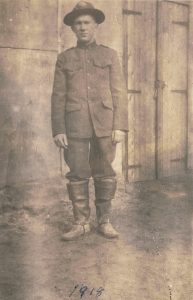
My maternal grandfather was a stubborn Minnesota Swede, and you’d have to be to serve in the army in the wet trenches of France during WWI. He told me once that him and his buddies would all get a good laugh when a letter would arrive telling them to keep their feet dry. That was all he would say on the matter—his mementos said more about his deployment than he did: a shell casing pencil holder, an enemy bullet, and a medal. I watched this man completely crippled with arthritis drive a car that had no power steering and work in the yard by adapting his tools. You know that ergonomic shovel that comes with an extra handle? Grandpa made one for himself in the 1960s. He worked, albeit slowly and carefully, to make wooden toys for his three grandchildren. But he could not put on his own socks.
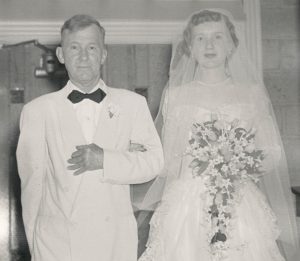
My paternal grandfather served as a Draft Warden in Minneapolis. And though he was able to draft my father, he was always frustrated that he was unable to draft his eldest son, my Uncle Tom. They didn’t find out the reason until after the war: Uncle Tom was a nuclear physicist working on the Manhattan Project. Meanwhile, back at home, Aunt Barb was a literal ‘Rosie the Riveter.’ And after the war, Uncle Jack ended up working in post-war intelligence around Europe. It seems a bit comical to think that my 6’4” uncle with very distinct features was sent as a spy, attempting to blend in with the local population.
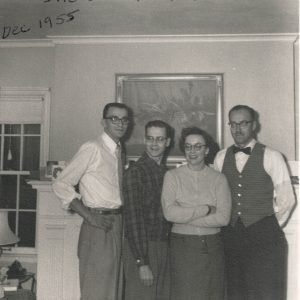
My dad arrived in the Philippines in time for the mop-up operations tasked with flushing enemy hold-outs from caves and bunkers. He was also an amateur photographer. Those thick pieces of curling paper? His memories from the war. The scrap of fabric? A Japanese flag. They were hidden from us and (to an extent) himself because he did not want to be reminded of the realities of the horrors he saw, the frightening memories they brought back, and the friends he lost.
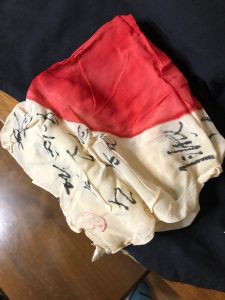
Fortunately, his faith gave him peace and he was able to put the memories to rest: “I don’t need to keep them to remember.”
Sadly, this is not the case for many. Every 60 minutes, a veteran attempts suicide. While I feel very fortunate that I was able to hear stories from these family members as I grew up, others have not been so lucky.
My heart goes out to the wives, parents, siblings, children, and relatives of those who never made it home and those listed as Missing In Action. But there is also the pain faced by those whose loved one is living on the street somewhere unable to cope, unwilling or incapable of accepting help.
The men and women like my grandfather and his children served willingly. Many of the veterans we help now served during the Vietnam era. A drafted generation that fought what must have felt like a fruitless war. Many have suffered everyday since, facing new demons such as ALS, MS, and Parkinson’s all connected to Agent Orange.
As we prepare to celebrate another Memorial Day, it is important to remember the sacrifice of all those who have served our Country and secured our freedoms. We can all go a step further in honoring those who lost their lives in service by taking a moment to think about how we can help lessen the burden on the shoulders of 100,000+ veterans living with PTSD. There are local & regional groups working to stop veteran suicides, and others pairing rescue dogs with veterans. Take a few minutes and do a little research – if we all took the time or donated a few dollars, we could literally become part of a network that could save a life.
We serve them because they once served us. We do this because of family. We do this to honor both the living and the dead. We do this simply because we can and it is well worth our time and resources.
-Geniene Haack
